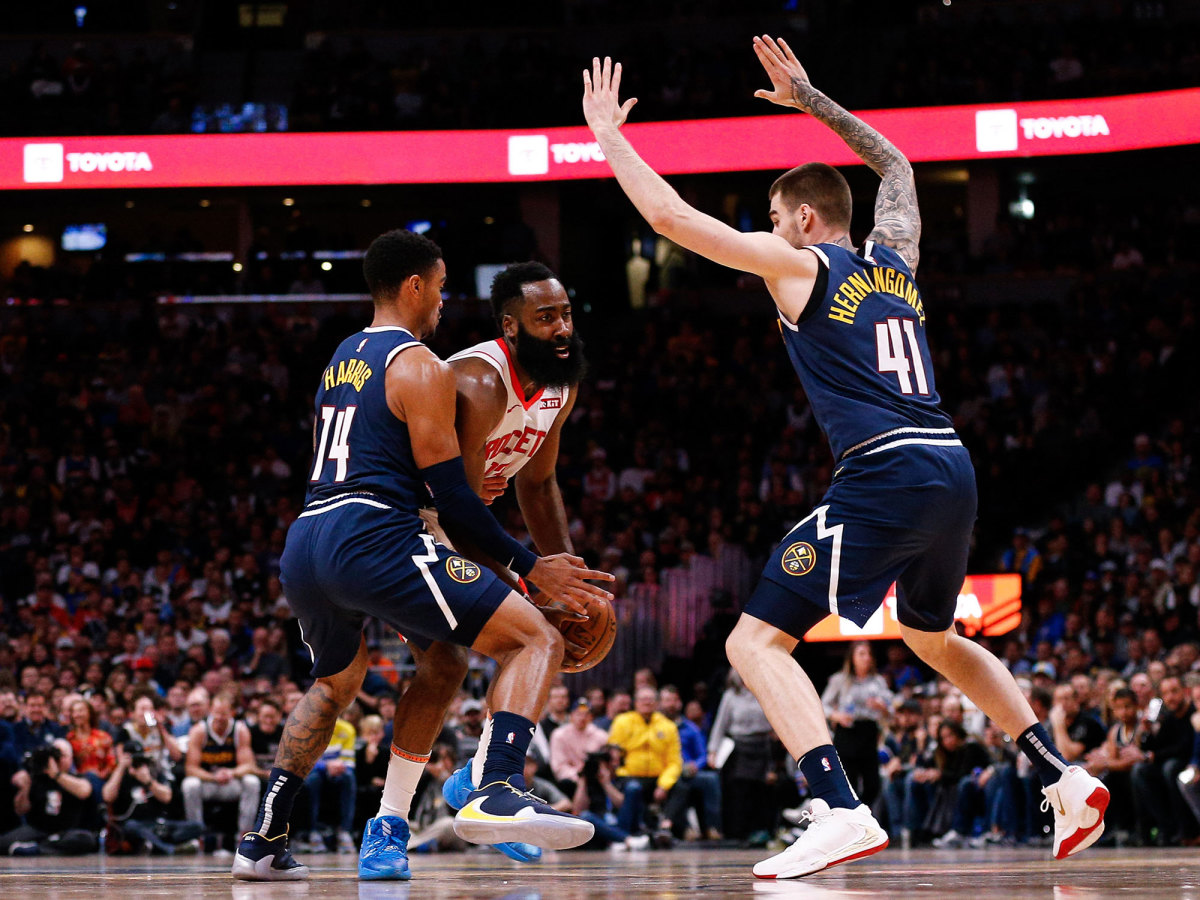Nuggets' Stingy Defense Keys Hot Start to Season

If you’ve followed Sports Illustrated’s NBA coverage the last two seasons, then you know two things—I love starting all of my stories with a corny joke in the first paragraph, and I’m incredibly high on the Nuggets. Denver rewarded my faith last year by snagging the second seed in the West before bowing out in the second round of the playoffs. Even in a more loaded conference this season, the Nuggets are on an even better pace through 13 games, jumping out to a 10–3 start, thanks in large part to a surprisingly stingy defense.
When Denver was nothing more than a League Pass curiosity, its defense was typically the biggest obstacle on the road to success. Over the last three years however, head coach Michael Malone has coaxed significant improvement from his team when it comes to slowing down opposing offenses. Denver went from 23rd in defensive efficiency in 2018 to 10th last season. And after a 105–95 win over the high-powered Rockets on Wednesday, the Nuggets currently have the eighth-best defense in the Association.
Denver probably peaked with its performance against Houston. The Nugs held the Rockets under 100 points for the first time all season, snapping their eight-game winning streak. Houston entered the matchup with a league-best offensive rating of 112.7, but managed a paltry 97.9 offensive efficiency against Denver. The Nuggets were aggressive in going after James Harden, sending constant double teams his way—at times leaving Russell Westbrook open on the perimeter—and daring his teammates to shoot. The non-Harden Rockets combined to hit only 8-of-30 attempts from three, and as a team Houston shot only 42.1% from the floor. (Harden finished with 27 points and was a minus-17. He hadn’t scored less than 35 points since a Nov. 3 loss to Miami.)
The Nuggets’ success was about more than simply forcing so-so shooters to miss shots. What Denver lacks in a traditional wing stopper it makes up for in relentless activity. Gary Harris, Will Barton, and Paul Millsap are all max-effort defenders in the starting lineup, while the likes of Torrey Craig and Jerami Grant are bringing the same level of intensity off the bench. We saw this to a degree last season—and I wrote about it then, too: As opposed to hiding someone like Nikola Jokic, Malone instead typically forces his centers to be aggressive against Harden-esque ball handlers. This puts a lot of pressure on the other players on the floor, and their activity is the key to scheme’s success.

It’s impossible to ignore the chaos caused by Denver’s most energetic defenders. Harris often finds himself in the pocket of the opponent’s best scorer, inching closer and closer to great shooters while relying on his footwork to cut off drives. Millsap frequently matches up with smaller and quicker players, but the 34-year-old’s veteran know-how makes him difficult to blow by as well as an expert helper. Barton is basically as unhinged on defense as he is on offense. And Craig is one of the more unsung defenders in the league, bringing a tenacity that’s comparable to the likes of Patrick Beverley or Marcus Smart. While he’s not quite in their league, he also goes hard every night without the plaudits or reputation as an irritant.
What separates this Nuggets team from last year’s version—or the one from the playoffs, which wasn’t as stout defensively but also wasn’t exposed—is how integral the defense is to the overall success. While Denver’s defense has improved, its offense has slipped. The Nuggets’ 107.0 offensive rating is only 17th best in the NBA, a steep drop after three straight top-ten finishes. The starting lineup of Jamal Murray, Harris, Barton, Millsap, and Jokic is excelling on both ends of the floor, but other units haven’t quite held up their end of the bargain scoring-wise. And unlike other contenders who underwent massive summer changes, outside of Grant, Denver’s rotation is largely the same as last season’s.
It’s an interesting situation. Can Malone truly rely on his defense to be the biggest factor in his team’s success? Can both the offense and defense be elite at the same time? Or are the first 13 games of the season a little bit of a mirage on both sides of the ball? The league saw glimpses of the Nuggets’ defensive potential last season. While they haven’t shot up the rankings in terms of defensive efficiency, the Nugs’ 102.6 defensive rating through the early stretch of this season is considerably better than last year’s mark of 108.1. And half of their 10 wins have come against offenses currently in the top half of the league.
The Nuggets won’t face the Lakers or Clippers until early next month and early January, respectively, and those matchups will go a long way in measuring how the scheme can hold up against multiple superstars. (Denver was gashed by the Mavs last month, a game in which the bench played particularly poorly.) There are other reasons to believe the Nuggets could come crashing down to earth, like how poorly they rank in hustle stats such as deflections and contested shots.
For now, Denver is riding a connected defense and some close wins to a hot start. It’s too early to say if this year’s Nuggets are definitively better than last year’s, or what that would even mean in a top-heavy West. While the Lakers and Clippers are the consensus top-two, Denver is certainly in the conversation to be the third-best team in the conference. If the defense does ultimately continue on its current pace—and the offense finally starts playing to its potential—than the Nuggets could be closer to the top than initially expected.
